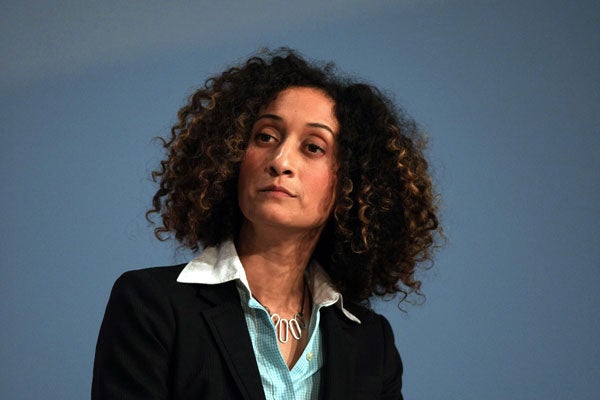To Miss With Love, By Katharine Birbalsingh

Katharine Birbalsingh is the deputy head whose observations on South London schools in her blog, and at the Conservative Party conference, put her under pressure to resign from a Streatham "Academy". You needn't agree with her views, or how they were publicised, to call this over-reaction. And this fictionalised re-creation – borrowing its title from ER Braithwaite's To Sir, With Love (1959) – will be pored over for political significance.
Braithwaite's novel – its main character was called Rick Braithwaite – attacked the bigotry of pupils and teachers, and had a romantic sub-plot. Birbalsingh's novel is the diary of "Snuffy", an English teacher who spends more time controlling her charges than teaching them. It follows a school year. It too has a romantic sub-plot: the strain on Snuffy's marriage to "Liberal" (Birbalsingh is not married – and she taught French, not English). But the main focus is on the psychological warfare in classroom and staffroom.
Where Braithwaite was cool and acerbic, Birbalsingh is upbeat, chipper. Apart from the irritating and sub-Bunyanesque names she gives the teachers and taught (Furious, Seething, Deranged, Ms Alternative, Mr Hadenough), it's a breezy read. Mr Hadenough (who has a parallel in Braithwaite, a Mr Hackman) is the archetype of all young teachers at the end of their tether. ("They won't listen. They won't fucking do what we say!") In addition to having to deal with fights, with thefts, with crowd control, they have to mark through their evenings. Teachers in Snuffy's "Ordinary School" would be astonished by the visit Braithwaite pays to elderly friends, who tell him "Don't fall into the habit of bringing work home", after which "Never again did I take notebooks home for marking". Braithwaite would likewise be amazed at how Ordinary School's teachers live in constant fear of OFSTED, and its ever-imminent arrival. OFSTED grades schools from 1 to 5. To be graded 3 is to be "satisfactory" and, as Hadenough remarks, "Only in teaching is 'satisfactory' unsatisfactory". Birnalbaugh captures well the paranoid effect produced by targets. Ditto the formulaic planning of lessons.
Snuffy/Birnalbaugh wants "benchmarking" (public announcements of marks to encourage competition), an ethos which enforces exclusions, an end to institutional pussyfooting for fear of allegations of racism. She admires the politeness of children in well-disciplined schools, often private ones. She is generalising.
Schools do not live outside society; they live in it. Ordinary's star student is a dedicated Guyanan boy she calls Stoic. That he is Guyanan seems a conscious nod to Braithwaite, also Guyanan, and horrified by the lack of work ethic he found in English schools. Stoic fails to get into Oxford. Snuffy blames the school: "We haven't taught you to believe in yourself". Private school kids, she adds, have been told, repeatedly, that life owes them "wonderful surprises". Ergo, their confidence is greater.
And here, in this challenging and spirited book, is where Birbalsingh and I part company, and where free-schoolers and entrepreneurs will rush in. Private schools are nests of privilege and protectionism. Society – big or otherwise – let Stoic down. Yet Birbalsingh, plainly an inspiring teacher, deserves to be read, perhaps especially by Kenneth Baker and Chris Woodhead.
Join our commenting forum
Join thought-provoking conversations, follow other Independent readers and see their replies
Comments
Bookmark popover
Removed from bookmarks